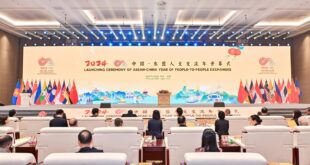Il-Dong Kwon, Vietnam lead at Boston Consulting Group (BCG), says Vietnam has an opportunity to build a beyond-great enterprise culture in a time of technological revolution.
“A young, vibrant economy like Vietnam certainly has the potential to attract and nurture beyond-great companies,” Kwon wrote, as he quoted insights from BCG’s latest book titled “Beyond Great: Nine Strategies for Thriving in An Era of Social Tension, Economic Nationalism, and Technological Revolution.”
He has been with BCG’s Vietnam office for seven years working with industry leaders and central and provincial governments on their strategy and large-scale transformation programs. He also co-leads BCG’s work in risk management for the Asia Pacific region.
He stated, despite the pandemic, foreign direct investment (FDI) has continued to flow, especially in the tech sector, where heavyweights like Microsoft, Apple, Sony, Nokia, Cisco, Alcatel-Lucent, and many others are building their manufacturing, software development and R&D hubs.
In 2021, Vietnam and Singapore began discussions on potential digital economy agreements (DEAs), which will accelerate and scale the country’s tech startups into new markets.
“Vietnam has an opportunity to begin on a clean slate and establish a beyond-great enterprise culture that is more responsive, responsible, inclusive, and agile in the face of disruption,” Kwon said.
However, Vietnam, despite being Asia’s fastest growing economy, according to the author, is amongst the many Asian economies that were impacted by Covid-19, which almost crippled its SME sector, and now the Ukraine-Russia war, which is exacerbating global supply strains from food to fuel.
On the upside, the country is on its path to recovery, with a 2022 gross domestic product (GDP) outlook between 6% to 8.5%. Vietnam’s Minister of Information and Communications, Nguyen Manh Hung, said in retrospect of the nation’s hundred-year push for digital transformation across all aspects of economic, political and social life, amid ICT sector revenues climbing 9% in 2021 compared to 2020.
 |
|
Il-Dong Kwon, Vietnam lead at Boston Consulting Group. Photo by BCG |
Challenges for enterprises
In 2021 alone, 5,600 digital technology enterprises were set up in Vietnam.
That said, many Vietnamese enterprises have struggled to remain agile and evolve to meet new and pressing consumer demands, especially SMEs that account for 98% of businesses in the country. Studies have found that investment cost is a top digitization barrier for Vietnamese SMEs.
“Digital transformation is also key for Vietnam to achieve its 2050 targets of becoming a high-income country and a ‘net-zero’ emissions economy, but this too requires a more inclusive, leave-no-one-behind approach to digital access and education,” Kwon stated.
He noted trade safeguard measures imposed by countries like the U.S. and U.K. to protect their domestic manufacturers are estimated to have cost Vietnam $12 billion in terms of exports, mostly involving key export items like metals (aluminum and steel), seafood (prawns and fish), plywood, construction materials, and chemicals.
“These trends will only accelerate given the pace of disruptive forces, leading to an overall shrinking of the average lifespan of companies. The odds of failure are six times higher today than they were 40 years ago. It’s time to rewrite the rules of the executive playbook because going beyond great is the new great, and nothing else will cut it”, Kwon added.
While in the recent past, greatness was determined by delivering outstanding Total Shareholder Returns (TSR) and a building competitive advantage from differentiated products and services, and by leveraging scale and efficiency, the new world order call for more transformative approaches.
Building beyond-great enterprises in Vietnam
“Given the disruptive forces we’re dealing with, to be successful in today’s world, companies must deliver sustained impact to all stakeholders and pursue shareholder returns with a sense of purpose, move from products and services to customized solutions to deliver outcomes and experiences, and leverage not just a smart scale and cost advantaged delivery model but one which is also resilient, fast, and flexible,” Kwon wrote.
Young business leaders will need to make bold transformations across three critical dimensions – growth, operations, and organization – if they are to thrive in the current economic environment.
To grow beyond great, enterprises must reimagine their core operations to deliver societal impact that will generate sustained, high TSR while positively impacting all stakeholders.
They must seek to offer compelling digital solutions and experiences, leveraging digital technologies to identify unmet needs with new solutions. Leading-edge firms are using asset-light, digital, or e-commerce centric business models to refine their global game. They are more selective about what markets to enter and how to deepen their engagement in those markets.
 |
|
BCG’s latest book titled “Beyond Great: Nine Strategies for Thriving in An Era of Social Tension, Economic Nationalism, and Technological Revolution. Photo by BCG |
Operating as a beyond-great enterprise requires engineering ecosystems that supplement traditional value chains with dynamic new value webs that can create and deliver solutions, outcomes, and experiences that customers crave.
Investing in high-tech, multilocal factories and delivery centers, combined with low-cost capacities, can deliver fast and flexible customized offerings. Building a global data architecture will support greater understanding of the drivers of future performance, consumer behavior and winning value propositions.
Enterprises that are focused, flat and fast are those that have left the traditional matrix organizational model in the past in favor of agile customer-focused teams supported by platform capabilities.
Bureaucracy and red tape have no place in the journey to beyond great. Instead, they thrive with talent by acquiring or retraining a digitally engaged 21st century workforce. Such enterprises operate on an always-on transformation mode because competing and winning in volatile, rapidly evolving business environments demand being adept at pursuing multiple transformations at any given time.
- Reduce Hair Loss with PURA D’OR Gold Label Shampoo
- Castor Oil Has Made a “Huge” Difference With Hair and Brow Growth
- Excessive hair loss in men: Signs of illness that cannot be subjective
- Dịch Vụ SEO Website ở Los Angeles, CA: đưa trang web doanh nghiệp bạn lên top Google
- Nails Salon Sierra Madre
 VnExpress News The News Gateway of Vietnam
VnExpress News The News Gateway of Vietnam




